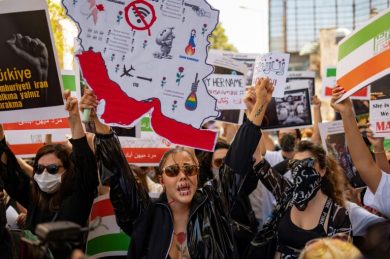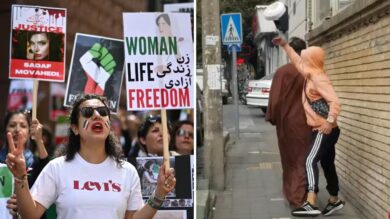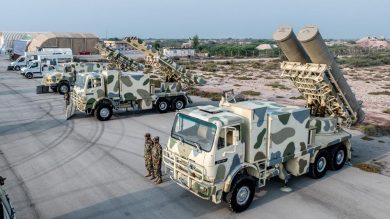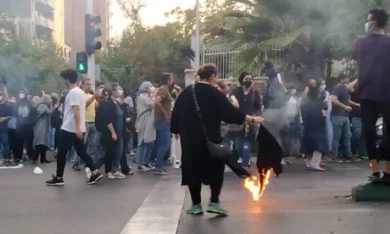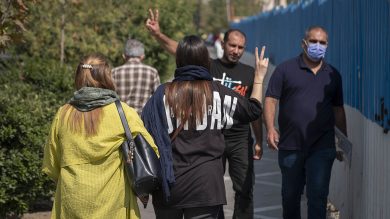In the face of systematic oppression, Iranian women have emerged as leaders of resistance, defying the Islamic Revolutionary Guard Corps (IRGC) and its brutal tactics. From the streets of Tehran to prison cells, these women have demonstrated unparalleled courage, standing against gender oppression, political persecution, and human rights violations.
The IRGC, designated as a terrorist organization by the United States, has long been responsible for suppressing dissent, using intimidation, imprisonment, and violence to silence those who dare to speak out. But Iranian women refuse to be silenced. This report highlights the stories of resilience from those who have risked everything to challenge the IRGC’s grip on power.
1. The IRGC’s Crackdown on Women: A History of Repression
The IRGC serves as the primary enforcer of the regime’s authoritarian rule, targeting women activists, journalists, and ordinary citizens who resist.
A. Tactics of Oppression
• Compulsory Hijab Laws: Women are arrested for refusing to wear the hijab, with the morality police acting under IRGC directives.
• Arrests & Imprisonment: Women protesting state oppression are detained under false charges, such as “acting against national security”.
• Torture & Sexual Abuse: Reports from Evin and Qarchak prisons reveal torture, sexual violence, and forced confessions under IRGC control.
• Digital Repression: Women’s social media activity is monitored, and those criticizing the regime face hacking attempts, online threats, and arrests.
Despite these tactics of fear, Iranian women remain defiant.
2. Stories of Resistance: Women Who Challenged the IRGC
A. Narges Mohammadi: The Voice That Cannot Be Silenced
A human rights activist and journalist, Narges Mohammadi has spent years in IRGC-run prisons for:
• Advocating against the death penalty.
• Exposing the torture of political prisoners.
• Defending women’s rights and civil liberties.
Despite multiple arrests, solitary confinement, and denial of medical care, she continues to write and campaign from prison, inspiring global solidarity.
B. Nasrin Sotoudeh: The Fearless Lawyer
A prominent human rights lawyer, Nasrin Sotoudeh has defended women arrested for removing their hijabs and political prisoners persecuted by the IRGC.
• She was sentenced to 38 years in prison and 148 lashes for her activism.
• Despite her imprisonment, she remains a global symbol of resistance, fighting for gender equality and human rights.
Her story proves that even behind bars, the fight continues.
C. Masih Alinejad: The Digital Rebel Targeted by the IRGC
A journalist in exile, Masih Alinejad has used social media activism to challenge Iran’s gender apartheid:
• #MyStealthyFreedom: A campaign encouraging women to share hijab-free photos, defying the IRGC’s rules.
• IRGC’s Attempted Kidnapping: In 2021, the IRGC plotted to abduct her from the U.S., revealing the lengths they go to silence dissent.
Her activism has helped mobilize global awareness of women’s oppression in Iran.
D. Sepideh Gholian: A Journalist Who Refuses to Be Broken
Sepideh Gholian, a labor rights activist, was arrested for covering workers’ protests. She faced:
• Torture and forced confessions under IRGC supervision.
• A prison sentence for reporting the truth.
• Rearrest after her release, as she continued to resist.
Her unwavering courage demonstrates that Iranian women will not be silenced.
3. The Role of Iranian Women in Protests
A. Women at the Forefront of the “Women, Life, Freedom” Movement
The 2022 protests, sparked by the death of Mahsa Amini, were led by women across Iran.
• Women burned their hijabs in defiance of the IRGC-controlled morality police.
• Students and activists demanded regime change, refusing to submit to fear and intimidation.
• The protests spread globally, with women across the world marching in solidarity.
The IRGC responded with violence, but Iranian women refused to retreat.
4. How the IRGC’s Oppression Backfires
Despite the repression, the IRGC’s tactics have failed to suppress Iranian women’s fight for freedom. Instead, it has:
• Strengthened global solidarity with Iranian women.
• Exposed the IRGC’s brutality to international organizations.
• Inspired younger generations to continue the resistance.
The more the IRGC tries to silence women, the louder their voices become.
5. Global Solidarity: How the World Can Support Iranian Women
A. Recognizing the IRGC as a Terrorist Organization
• The United States has designated the IRGC as a terrorist group, but other nations must follow.
• Sanctions against IRGC leaders responsible for gender oppression should be expanded.
B. Support Digital Freedom & Secure Communication
• Provide VPNs, encrypted messaging apps, and cybersecurity tools to Iranian activists.
• Prevent IRGC-backed cyber attacks targeting Iranian women online.
C. Amplify the Voices of Iranian Women
• Support journalists and activists in exile who document the IRGC’s human rights violations.
• Ensure media outlets cover the ongoing protests and women’s resistance.
D. Protect Iranian Women Seeking Asylum
• Governments should offer fast-track asylum processes for women fleeing persecution.
• Support networks must be established for Iranian women activists abroad.
Conclusion: Women Will Not Be Silenced
Iranian women have shown the world that they are fearless in the face of oppression. Their fight against the IRGC’s brutality is not just about gender rights, but about freedom, justice, and democracy for all.
“We will not be silenced. We will not surrender. We will win our freedom.”
The IRGC’s crackdown on women has failed to break their spirit. Instead, it has ignited a movement that cannot be stopped. The world must stand with Iranian women, ensuring that their fight for freedom is not fought alone.
Join Our Newsletter!
Stay informed with the latest updates, news, and ways to take action in the fight for justice and global security. Sign up now to get updates delivered straight to your inbox!

